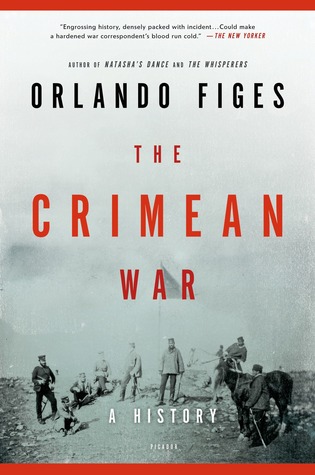
The Crimean War
A History
کتاب های مرتبط
- اطلاعات
- نقد و بررسی
- دیدگاه کاربران
نقد و بررسی

Starred review from January 17, 2011
All most people know of the Crimean War is the charge of the Light Brigade, but this war was both global and modern, insists noted historian and University of London professor Figes (The Whisperers: Private Life in Stalin's Russia) in his magnificent account. It was fought with industrial technology, railways, and steamships; 750,000 soldiers and uncounted numbers of civilians died. After an 1853 religious dispute with Ottoman leaders, Russian armies invaded a disputed area in present-day Romania. Longstanding anti-Russian anger in both Britain and Turkey boiled over into war. French opinion was less enthusiastic, but Napoleon III yearned for military glory. Although Russia soon retreated, Britain's cabinet wanted to inflict serious damage. The result was the massive 1854 British-French Crimean invasion. But the armies dawdled, resulting in a costly siege, bloody battles, and 18 months of legendary heroism and incompetence ending in a treaty that only temporarily restrained Russian advances and the Ottoman Empire's decline. Using French, Russian, and Ottoman as well as British sources, Figes has written a lucid, thoroughly satisfying, definitive history. 16 pages of b&w photos; 19 b&w photos throughout; maps.

February 1, 2011
Quick: What was the Crimean War about?
If you can't easily answer the question, or even locate the Crimean War within a couple of decades of the mid-19th century, then you are not alone. As Figes (History/Birkbeck Coll., Univ. of London; The Whisperers: Private Life in Stalin's Russia, 2007, etc.) notes, even in France, which lost some 100,000 soldiers in the conflict, the Crimean War is very nearly forgotten. The author locates the origins of the war—now remembered almost exclusively for the so-called Charge of the Light Brigade—in several proximate causes. The clash of three ambitious empires (Russian, Ottoman and British) was one; related to it was the growing Russian Orthodox presence in the Holy Land, and related to that the rivalry among Islam, Catholicism (and Anglicanism) and Orthodox Christianity. The French "were most alarmed by the growing Russian presence in the Holy Lands," writes Figes, and they pressed for ways to contain it—and not just that, but also the growing Russian influence in the Balkans, still dominated by the Ottomans. Louis Napoleon found perhaps unexpected allies in the British, rivals with Russia for dominance in Central Asia; for the Ottomans, meanwhile, the conflict was one in just many with Russia. The author ably chronicles the savagery of all parties—drawing on hitherto unknown Russian and Turkish archives, he reckons that the death count was more than 1 million, including the unfortunate dead of the besieged Russian city of Sevastopol—and illustrates the utter modernity of this first "total war." Figes closes with a fascinating account of how the war shaped the nations that fought it; in Russia, for instance, it helped launch the later pan-Slavic movement and is commemorated as a noble defeat against Britain's "aggressive imperialist aims in the Black Sea"—in short, as a foreshadowing of the Cold War and the "clash of civilizations" among Islam and the West.
Narrative history at its best, with patient unfolding of events unknown and forgotten—but that have consequences even today. A thoroughly impressive book.
(COPYRIGHT (2011) KIRKUS REVIEWS/NIELSEN BUSINESS MEDIA, INC. ALL RIGHTS RESERVED.)

November 1, 2010
Essentially a three-way clash among the British, Turkish, and Russian empires, the Crimean War was famed for military incompetence (think the Charge of the Light Brigade), heroism (think Florence Nightingale), and extraordinary ferocity (nearly a million soldiers and an untold number of civilians died). Wolfson History Prize winner Figes, an expert in Russian history noted for sprightly gems like Natasha's Dance, should do well here. With a national tour.
Copyright 2010 Library Journal, LLC Used with permission.

March 15, 2011
Figes record of fluent history writing continues with the origin, course, and consequences of the Crimean War of 185356. Fought between Russia and a coalition of Britain, France, the Italian state of Piedmont, and the Ottoman Empire, the war, which killed hundreds of thousands of people, began as a resumption of a century of Russian-Ottoman hostility. But what had previously been contested between those two powerscontrol of the Black Sea and its littoral, the rights of Christians in Muslim Ottoman landsby the 1850s attracted the attention of the industrializing Western powers. From the farrago of diplomatic and religious frictions underlying the war, Figes extracts explanatory clarity for its ignition in an intransigent Czar Nicholas I, who played into the hands of Britains belligerent Palmerston, who desired dismantlement of the Russian Empire. Following the statesmens work came the soldiers and sailors work, narrated by Figes in fearsomely vivid detail and with analytical precision. Equally acute about the wars ramifications, some of which presaged WWI, Figes restores historical significance and human suffering to the conflict.(Reprinted with permission of Booklist, copyright 2011, American Library Association.)

























دیدگاه کاربران